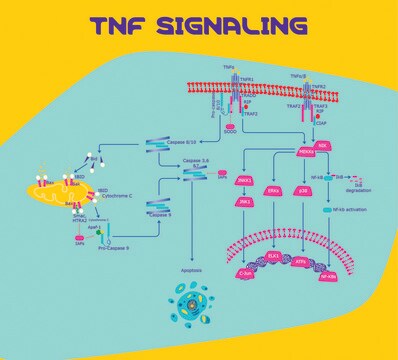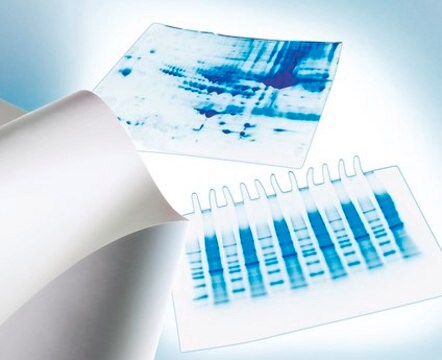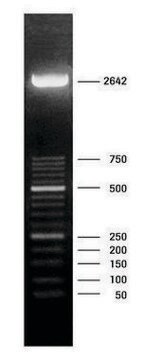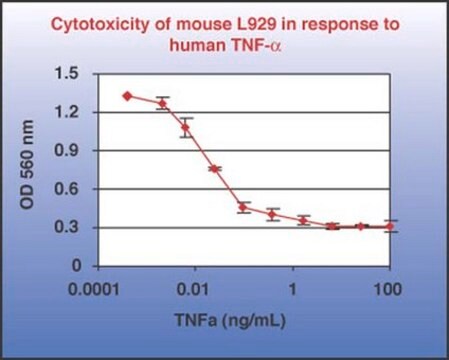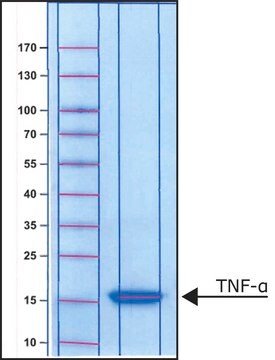추천 제품
일반 설명
Tumor necrosis factor- α(TNF-α), also known as cachectin, is an inflammatory cytokine that exists primarily as a 51kDa complex built up of 3 identical, non-covalently-linked polypeptide subunits (17 kDa, 157 amino acid residues, in human). TNF- αoccurs as a secreted, soluble form and as a membrane-anchored form, both of which are biologically active. TNF-α is secreted by neutrophils, activated lymphocytes, macrophages, NK cells, LAK cells, astrocytes, endothelial cells, smooth muscle cells, and some transformed cells.
특이성
The antibody binds to TNF-α. It does not cross-react with recombinant human TNF-β, IL-1a, IL-1β or IL-3, nor with recombinant mouse or human IL-6.
면역원
recombinant human TNF-α produced in bacteria.
애플리케이션
Anti-Tumor Necrosis Factor-α antibody may be used for dot blot at a working antibody dilution of 1:2000. The antibody may be used for neutralization assay; the ND50 is 1-3 μg/ml. Anti-TNF-α antibody was used for neutralization of TNF-α of Jurkat cells.
Anti-Tumor Necrosis Factor-α antibody produced in rabbit has been used in western blotting. It may also be used in enzyme linked immunoassay (ELISA).
생화학적/생리학적 작용
Tumor Necrosis Factor-α (TNF-α) is a cytokine produced by macrophages in response to stimulus by LPS. It plays a major role in mediating inflammation, tissue injury, pathogenic shock, innate immunity, apoptosis and autoimmunity. The physiological effects of TNF-α are mediated by receptors of TNFR super family. The TNF/TNFR signaling axis plays a critical role in mediating either survival or apoptosis depending on the class of adaptor proteins recruited in the cell. Association of receptors with a death domain causes rapid activation of caspases and results in cell death. TNF/TNFR also results in the activation of downstream pathways involving MAPK, p38, JNK and NF-κB that play a major role in innate immunity, acute inflammatory responses and homeostasis. The TNF/TNFR axis is also important in the pathology of various autoimmune and inflammatory disorders including a variety of malignancies and Alzheimer′s disease.
면책조항
Unless otherwise stated in our catalog or other company documentation accompanying the product(s), our products are intended for research use only and are not to be used for any other purpose, which includes but is not limited to, unauthorized commercial uses, in vitro diagnostic uses, ex vivo or in vivo therapeutic uses or any type of consumption or application to humans or animals.
적합한 제품을 찾을 수 없으신가요?
당사의 제품 선택기 도구.을(를) 시도해 보세요.
Storage Class Code
12 - Non Combustible Liquids
WGK
nwg
Flash Point (°F)
Not applicable
Flash Point (°C)
Not applicable
시험 성적서(COA)
제품의 로트/배치 번호를 입력하여 시험 성적서(COA)을 검색하십시오. 로트 및 배치 번호는 제품 라벨에 있는 ‘로트’ 또는 ‘배치’라는 용어 뒤에서 찾을 수 있습니다.
Hongyan Gong et al.
Experimental and therapeutic medicine, 17(1), 41-50 (2019-01-18)
Colon cancer is one of the most common types of gastrointestinal tumor. Previous studies have demonstrated that tumor necrosis factor-(TNF)-related apoptosis-inducing ligand (TRAIL) reduces the aggressiveness of colon cancer tumors and promotes the apoptosis of colon carcinoma cells. In the
Tumor necrosis factor
Chu WM, et al.
Cancer Letters, 328(2), 222-225 (2013)
Transmembrane TNF-alpha: structure, function and interaction with anti-TNF agents
Horiuchi T, et al.
Rheumatology (Basel), 49(7), 1215-1228 (2010)
Z Han et al.
The Journal of biological chemistry, 276(42), 38748-38754 (2001-08-22)
Non-steroidal anti-inflammatory drugs (NSAIDs) are inhibitors of cyclooxygenase-1 and -2 and are useful for prevention and cure of cancers, especially colon and rectal cancers. The NSAIDs indomethacin and sulindac sulfide have been shown to induce apoptosis of colon epithelial cancer
K A Papadakis et al.
Annual review of medicine, 51, 289-298 (2000-04-25)
Recent advances in the drug treatment of inflammatory bowel disease (IBD) have paralleled our understanding of the pathophysiology of ulcerative colitis and Crohn's disease. Several proinflammatory and immune-regulatory cytokines are upregulated in the mucosa of patients with IBD, and differences
자사의 과학자팀은 생명 과학, 재료 과학, 화학 합성, 크로마토그래피, 분석 및 기타 많은 영역을 포함한 모든 과학 분야에 경험이 있습니다..
고객지원팀으로 연락바랍니다.
